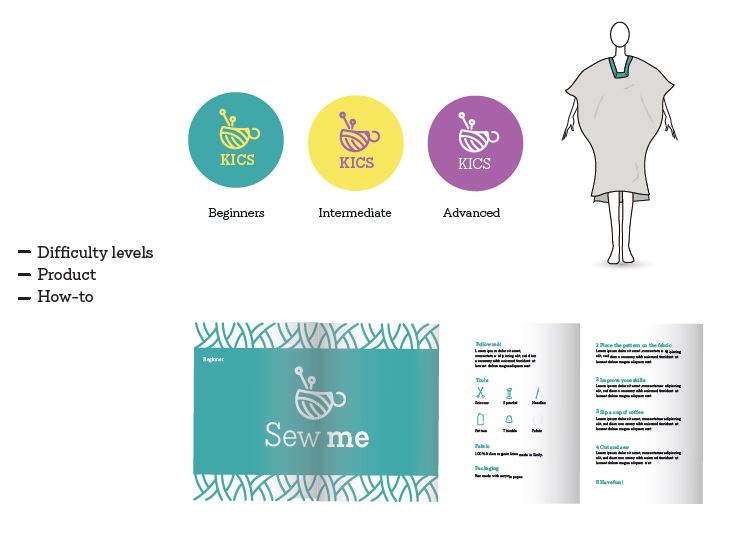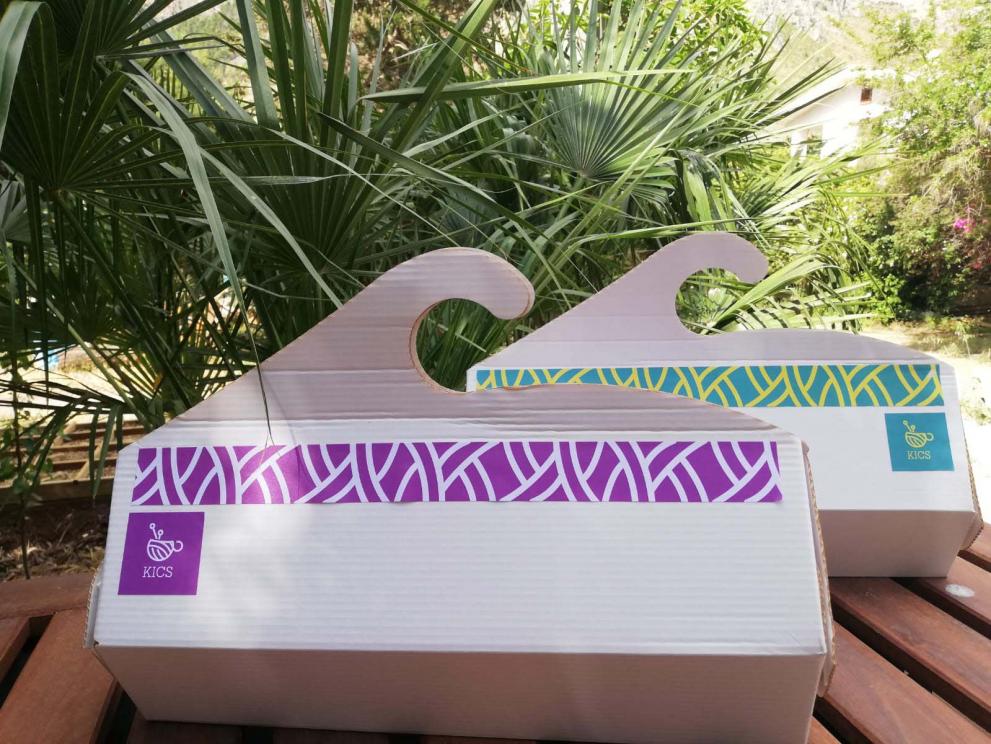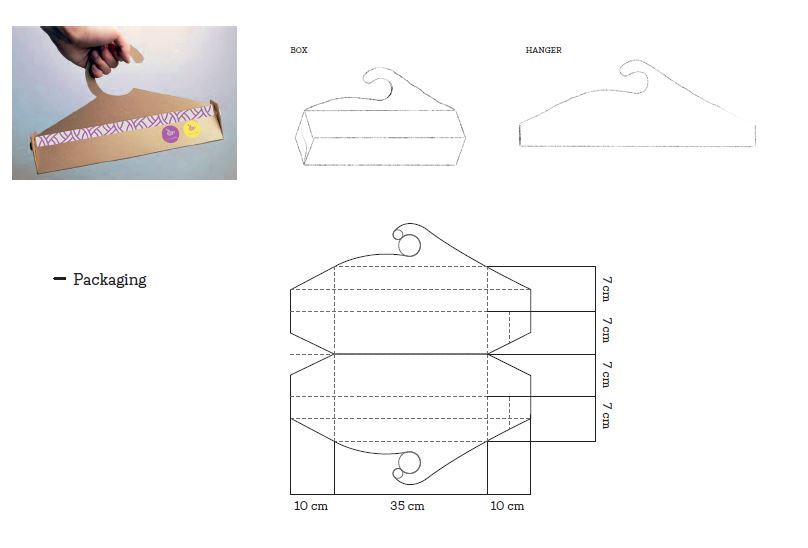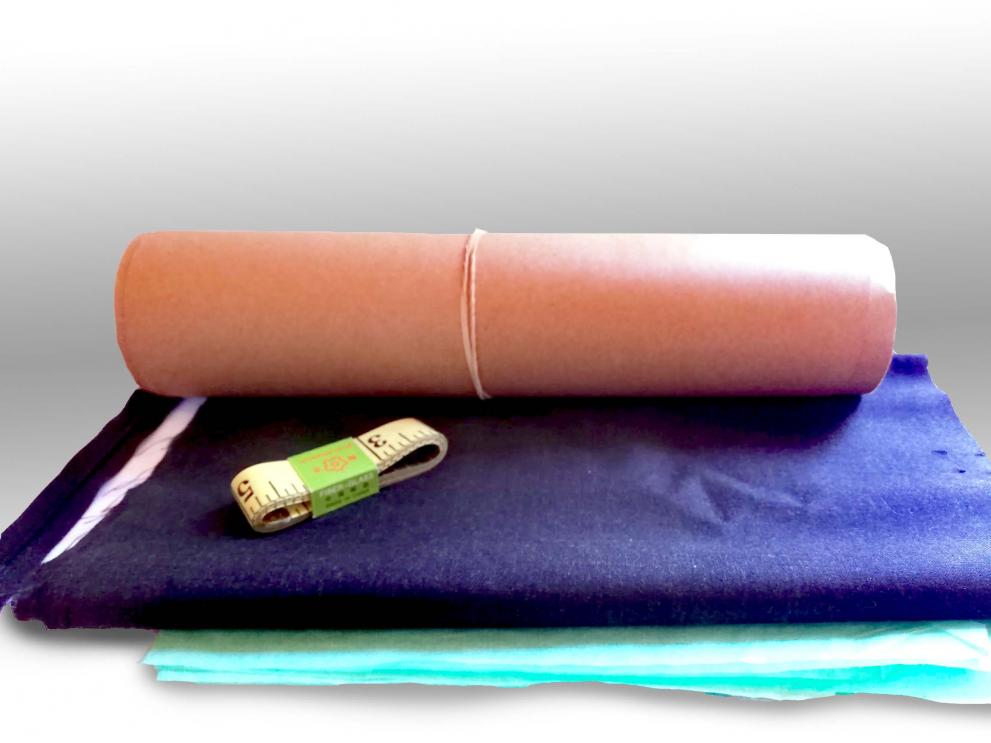
The project
KICS aims to overcome these obstacles by introducing a new approach: co-design sewing kits, with groups of beginners and intermediate sewers, in a social sewing environment, as well as knitting cafés. The kits will include the garment already cut into pieces, detailed sewing instructions (providing photos and videos) and other components needed (yarns, needles, zips, buttons, ribbons, elastic bands and so on). In addition, the kits can also include a guide for the managers of sewing cafés, identifying difficult aspects or the type of support that may be needed in-house. The idea is to support and foster the social role that sewing cafés play nowadays by offering an innovative product that encourages the participation of inexperienced sewers in this collaborative experience preserving locally-produced garments and fostering craftmanship in Europe.
Storytelling
THE IDEA:
KICS was born during the development of an innovative project for the T&C sector, TCBL. This project was a great melting pot of ideas and during one of several meetings, the crew of the project started to think:
• Why not use sewing kit to get people involved?
• Why there are tons of kits in the textile market, but nobody suits with the different skill levels of people?
From that two questions KICS started to take shape but it was not easy to answer these questions, the difficulties have been many and it has been hard to find the right environment for developing the idea and focusing on what steps to develop. While trying to find the crux of the issues, the solution came almost by accident and involuntary from a TCBL affiliated lab, Gullo Filati. This historical haberdashery in the centre of Palermo (Italy) had been organising sewing café for several years where people could, within a collaborative environment, create garments, also exchanging skills and knowledge about the textile field. The second partner, TCoE, was found within the partners who made up TCBL project, seen their pluriannual experience in the textile field. All this was perfect for the developmentt of the idea, but one thing was still missing, who would finance the idea? Fortunately, while the crew was looking for possible financiers, the Worth project began its funding program and in this way the idea could go ahead.

THE BIRTH OF THE PROJECT:
There is a market around the art of sewing, that is returning to be a fashionable activity. Unfortunately, in Europe this craftsmanship has been lost and those who approach sewing must struggle hard to reach an acceptable level of knowledge, such as being able to make their own clothes. In parallel there are many people who would like to sew at home but who do not find sewing projects at their levels. The main problem for those experts who prepare sewing kits is that they can hardly put themselves in a beginner & shoes. Furthermore, more time is spent on packaging and promoting the package than on experimenting with groups of sewers at different skill levels. So, it happens that a beginner buys an appealing kit that promises the realization in a short time of an article or a garment, when then the buyer is faced with complicated explanations and obstruse terminology, taken for granted that certain steps are clear to the user. This generates frustration and hardly the customer will buy another kit from the same seller. KICS overcome these obstacles, introduced a new approach: co-design sewing kits with groups of beginners and intermediate sewers in a social sewing environment, before proposing them to the market. The different skills levels have allowed for qualitative upgrade from small items to simple garments and then moving on to propose articles of increasing difficulty. In addition, it has been very important to provide instructions that are well written, to avoid user frustration for an incomplete or badly done task. This has been achieved by preparing kits that included the garment already cut into pieces, step by step sewing instructions and everything needed to do the job (yarn, needles, zippers, buttons, ribbons, elastic-band and so on). In addition, the kits have included a guide for the managers of sewing cafés, identifying difficult aspects or the type of support that may be needed in-house.

THE CREATIVE PROCESS:
After several skype conferences Gullo Filati and TCoE designed a simple garment (a skirt), in different sizes to choose from. As design we mean: the sketch of the garment, the sewing pattern, a real prototype, and the basic instructions with the sequence of the necessary steps for its realization. TCoE and Gullo Filati also decided the kind of fabric to be used. TCoE was the first to test the kit in a sewing cafè, organising this collaborative environment inside their structure with a box with a very raw design. This first test was really important, and it gave to the partners an effective analysis on the feasibility of the entire project, resulting a very precious segment for the pursuance of the path. Gullo Filati, with the useful feedback from this first test, started to design the definitive box with the help of a designer, this because it was important that the kit had a well-designed, elegant, and captivating; in the meantime, they started to organise others sewing cafè, for a better understanding of the aspects to improve (instructions, possible changes of the type of garment, design of the box, etc). At that point, the project had to face its first slow down. One of the pillars in the organisation of sewing cafè is the reduced number of participants for a better management of the sewing cafè itself. This principle clashed with the industrial production of boxes of all the companies contacted by the partners. How to solve this obstacle? Fortunately, one of the several TCBL Labs (Consorzio ARCA) gave partners the opportunity to use the laser cutting machine inside of its structure and in this way the project had the chance to produce just the boxes necessary to continue the tests. At that point, while Gullo Filati was ready to test the definitive design of the box, attempting to start the selling too, the project had a heavy setback due to corona virus.

THE COLLABORATION:
The whole structure of the project is based on collaboration. The main tool used by the project, the sewing cafè, it is a collaborative environment where all the participants are able to exchange skills and knowledge on textile field. The partners, in this context, worked side by side, improving each other. The entire project could not have started without a close collaboration and for this reason the partners know perfectly well that working together is the best way to develop things.

THE FUTURE:
When the partners will have the opportunity to finish the project, they will try to sell the kit box through different channels as e-commerce platforms or directly through the organisation of sewing cafes. Moreover, they would like to spread the pillars of this project to others subjects within EU that want to organise sewing cafès and boosting the principles of collaborative environments.

THE MESSAGE:
Why work alone when you could collaborate? Shaping the future with collaboration!

- Project locations
- ItalyUnited Kingdom
- Projects Edition
- WORTH Partnership Projects I
- Project Call
- 2nd Call Projects
- Project Sector
- Textile and clothing
- Project Challenge
- Reinventing craftsmanship
Contact
Gullo Filati
Gullo Filati is a historical haberdashery located in Palermo. For over 50 years Gullo Filati has been serving the regional, national and international wholesale market with yarns and fabrics. In 2016 the company launched the first open-air Knitting Café, gathering participants around tables under umbrellas in Santa Anna Square. The initiative was a great success, so they repeated the event on a monthly then weekly basis in early 2017 until now when the workshops take place several times a week.
- Name
- Gullo Filati
- Postal address
Italy
TCoE
The Textile Centre of Excellence located in Huddersfield, UK, offers quality assured, flexible training at all levels from pre-entry traineeships to foundation degree equivalent programmes. The Centre is an approved BS EN ISO 9001: 2008 organisation, holds the ‘Matrix’ standard for Information, Advance and Guidance (IAG) and has secured the Creative Skillset Industry Tick for industry relevant training and skills provision. The Centre operates as a Group Training Association and works closely with its member firms to ensure the voice of the industry steers skills development. The Textile Centre of Excellence also works with a range of public and private sector organisations to help develop activity to stimulate innovation and to enhance skills in areas of relevance to the region’s manufacturing industry.
- Name
- TCoE
- Postal address
United Kingdom
